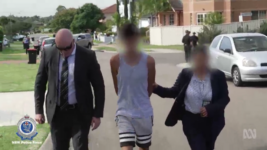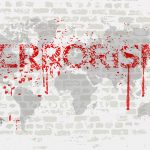Systemic Criminal Justice Bias Sees Only Muslim Crime Designated as Terrorism

In the wake of two mid-April Sydney stabbings that garnered intense public attention, not only due to the violence involved, but also the subsequent divergent manner in which the NSW Police Force and, indeed, politicians and intelligence agencies, have approached the investigations.
The first stabbing happened at a Bondi Junction mall and involved a white Australian man murdering six people in a manner clearly targeting women. And happening just two days later, the second incident saw a 16-year-old Muslim Arab boy nonfatally stabbing a well-known priest in Wakeley.
The Bondi stabber was killed at the scene. But due to the approach the authorities took to his case, if he’d lived, he would have been prosecuted as a mentally ill offender. Yet, in respect to the teenager who stabbed a priest, police labelled him a terrorist and then carried out raids and multiple arrests.
As the globe just learnt, context is everything. And in this context, the stark disparities in approach occurred after decades of similar such investigations and prosecutions have led to the demonisation of Muslim offending and even behaviour as terrorist offending, while white terrorism is downplayed.
And a 24 April Australian Muslim Advocacy Network (AMAN) briefing note has been distributed to key stakeholders, including the authorities, which clearly details not only how institutionalised prejudice is at play in the recent approach to stabbings, but further how this bias has long operated.
A tale of prejudicial approach
AMAN cites five recent policing incidents, which highlight that despite the laws on the books being colourblind, when it comes to application, they result in discriminatory outcomes, due to, as Randa Abdel-Fattah put it, the long established “terrorist is the automatic signifier for Muslim” trope.
The first incident involved a pro-Israeli man placing a homemade bomb in the driveway of a Botany house threatening the owner to take down a Palestinian flag in January. And he was charged with intimidation – not terrorism of a political nature – and he was sentenced to 12 months prison.
In March, after Executive Council of Australian Jewry CEO Alex Ryvchin appeared on TV decrying imams making derogative comments about Jews, NSW police raided a Muslim disability pensioner in Waterloo, who tweeted Ryvchin was lucky he didn’t suffer the same fate as the Botany resident.
These incidents were raised as showing a difference in the official approach to pro-Israelis and pro-Palestinians. And these distinctions fit intimately with those AMAN is raising in terms of the Bondi and Wakeley incidents, and further give reason for a renewed suburban Muslim terrorism scare.
The third incident is the Bondi mass murder, which saw NSW police commissioner Karen Webb declare it nonterror prior to the formal identification of the killer, whereas the fourth, the Wakeley stabbing, was declared a terror incident by Webb prior to psychological assessment of the offender.
The fifth incident revealing prejudice relating to the last two incidents, involved 400 police officers being deployed to raid 13 NSW locations and arrest six teenagers, who hadn’t committed any violent crimes but were merely associated with the Wakeley stabber, a week after the incident.
Charging disparities
AMAN cites the moments when commissioner Webb provided a designation to both the recent Sydney stabbings, as they clearly display her difference in approach.
In relation to the white man who killed six, Webb made the determination that this wasn’t terrorism just hours later and prior to official identification, despite his targeting women and other nations having recognised the misogynistic Incel ideology as constituting terrorism when such events occur.
This is then contrasted with the commissioner having determined the Wakeley incident as “religiously-motivated” terrorism at 1.35 am, again just hours after the crime, and prior to a next day assessment that the boy wasn’t suffering mania.
The Queensland police inquiry into the 2022 sovereign citizen killings in Wieambilla is raised, which is instructive as the policing habit of charging certain violent Muslim crimes as terrorism has played out nationwide, as has the habit as charging terrorism committed by white people as regular crime.
The Wieambilla killings occurred on 12 December 2022, and involved three adherents of the far-right sovereign citizen movement. One of the trio shot three individuals, including two police officers, in an obviously ideologically-motivated incident.
The briefing note refers to a 16 February 2023 press conference, in which Queensland police deputy commissioner Tracy Linford told the press that on designating the incident as terror two months after the fact, police had extensively checked the trio’s digital footprint and taken 190 statements.
An aggravated sentencing process
Not only are these terror designations, and the perception they generate, being consistently applied to Muslim individuals resulting in their entire community’s demonisation, as well as then being over-policed and surveilled, but the severe penalties applied to terror crimes further wreaks havoc.
The 16-year-old boy who stabbed a priest nonfatally is facing one count of terrorist act, which carries up to life imprisonment. And several of his associates, aged 16 and 17, have been charged with terrorism conspiracy, which again carries life and can merely constitute preparation or planning.
Terrorism charges not only result in extreme penalisation, but they also lead to a different approach when it comes to sentencing by the courts, as former Victorian Supreme Court Justice Mark Weinberg set out in a 2021 paper, based on Australian court authorities.
Weinberg notes that when sentencing for terrorism, the absence of victim or harm is not a mitigating factor: an aspect of a crime that results in a lesser sentence. And in contrast to other crimes, if a terror plan is considered amateurish, this neither serves to lessen the severity of crime.
And principles like general deterrence are primary when sentencing for terrorism, whereas personal circumstances, mental health issues, youth, remorse or any interest in rehabilitation aren’t factored in.
A convenient rollout
“Throughout Australian prosecution history, only one Australian white male has been prosecuted for terrorism,” AMAN makes clear, and further outlines that numerous white males have also been prosecuted and given light sentences for extreme acts of violence considered mental health related.
Terrorism is defined under Australian law as a serious violent or harmful crime to property or person/s, which is supposed to advance “a political, religious or ideological cause”, via the coercion or intimidation of a government or the public or a part of either.
AMAN is advocating for the removal religion as a motivation for terrorism in the official definition, as it is only ever applied to Muslims who have committed or considered violent acts.
The legal group underscores that globally terrorism is considered a politically-motivated crime, and the religious motivation trigger is very much an Australian addition, and while it is only ever applied to Muslims, what’s actually being prosecuted are ideological beliefs, not orthodox Islamic views.
In summing up, AMAN notes that the recent designation of the Wakeley incident as terror is causing “legitimate grievances within the Australian Muslim community”, and it’s coming at a time, when it’s already suffering in regard to the government’s response to the Gaza genocide.
And as AMAN advisor Rita Jabri Markwell recently told Sydney Criminal Lawyers, she considers the terror scare around the Wakeley stabbing as advantageous political theatre designed to reinforce the government support for Israel at a time when the overwhelming support is for Palestine.







